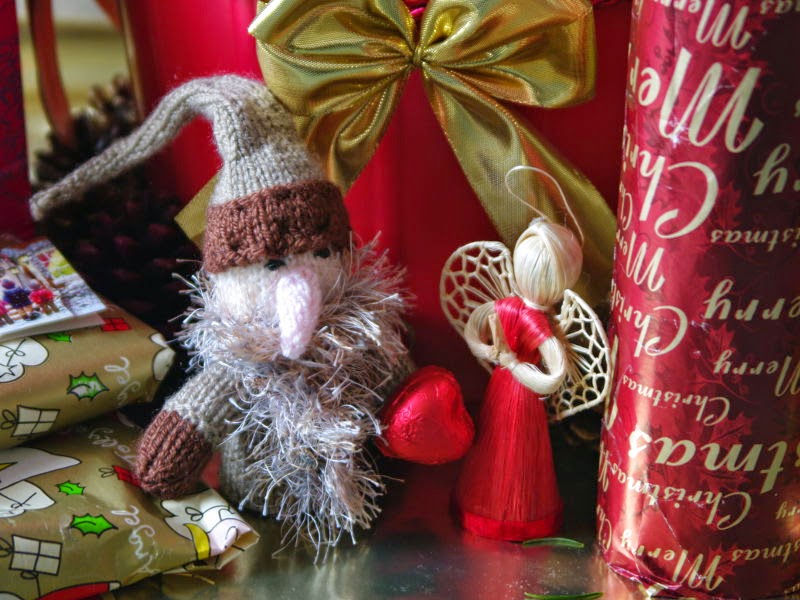Originally published in daily episodes on Facebook and Twitter over the 2014/5 Christmas period, the story of Wobbit the wood elf was inspired by @OneDad3Girls 's tales of Buddy the elf and a knitted friend created by one of our clever neighbours.
20th December: Wobbit the wood elf lives in a large and rather overgrown garden in a small Sussex town. As the wood had retreated in the face of the encroaching houses, the other elves and fairies had gone too and Wobbit was rather lonely. As the winter solstice approached and coloured lights started appearing in the human houses he considered the momentous and rather frightening step of moving inside.
Winter Solstice: Wobbit finally plucked up his courage and moved into the human house. He wandered through the living room while the humans were busy watching Casablanca on the telebox. He was amazed to find that they had celebrated his arrival by setting up a decorated tree especially for him.
22nd December: Wobbit was thrilled with his new home even though the silly human who had left this offering under the Christmas tree had mislabelled it as a butterfly house.
23 December: When he lived amongst the trees, Wobbit lived on nuts and berries. In the house, he worried about running out of things to eat. Fortunately he found boxes full of strange sweet nuts a short climb from his new house.
Christmas Eve: On his way back from his foraging expedition, Wobbit met an angel who told him that she once graced the top of the tree. In recent years her place had been taken by a glass robin and she found herself at the bottom. On Christmas day she would be surrounded by presents - but none would be for her.
Christmas morning: Early in the morning, Wobbit returned to Angel's place at the foot of the Christmas tree and surprised her with a gift. She began to think that the bottom of the Christmas tree was nicer than the top after all.
Christmas evening: As the humans had decided to watch Doctor Who on the telebox, Wobbit and Angel clambered into the tree and watched too. Angel said that she would love to live in a blue box and have adventures.
Boxing day: Wobbit took his friend Angel for a Boxing Day walk round the garden. As they explored, she marvelled at the colour and scents of the flowers. Wobbit pointed to the wall and told her that his tree was just out of sight on the other side.
27th December: Wobbit and Angel took advantage of another bright, cold day to go exploring again. From their vantage point, in the Christmas wreath, they had a good view across the garden, including Wobbit's tree. Angel said it looked pretty with the catkins but wouldn't it be very draughty?
28th December: As the weather was so unpleasant, Wobbit the wood elf stayed inside and painted his new house.
30th December: Angel had a plan. She wrote a note in her very best writing. All they had to do was hide in the box and wait. Wobbit wasn't so sure that the humans would be fooled but he didn't have any better ideas.
31st December: Bang! Crash! After a bumpy ride in the box, Wobbit and Angel waited for what seemed like an age. They looked outside the door and ... the humans had taken the bait! The box was fixed to the garden wall in a lovely sunny spot near some flowers. As we say goodbye to Wobbit and Angel, their adventures in the great outdoors are just about to begin.
Postscript: A few days later, the humans packed up their decorations and disposed of the tree. Strangely there was one missing. No one could quite remember which one it was.














